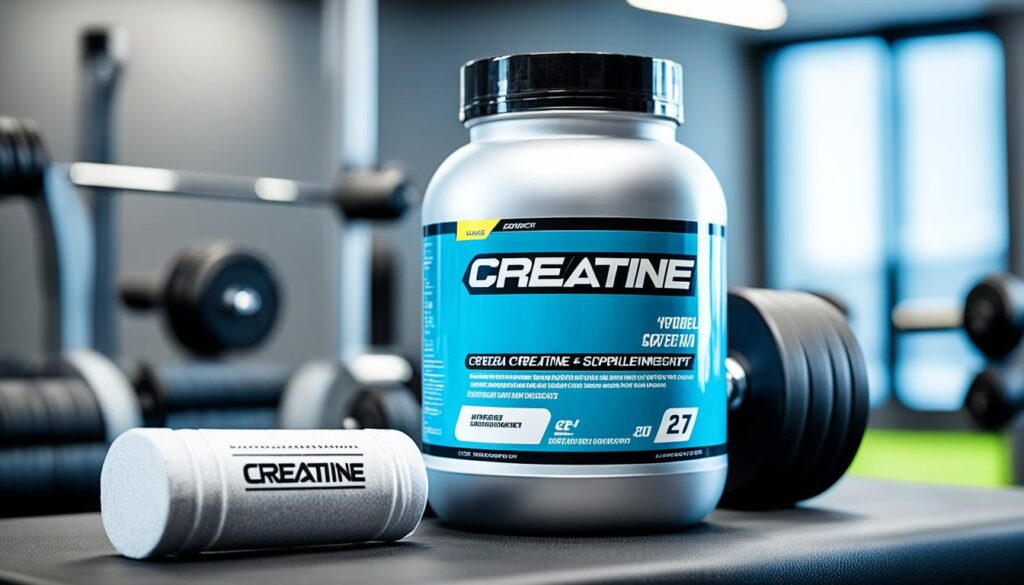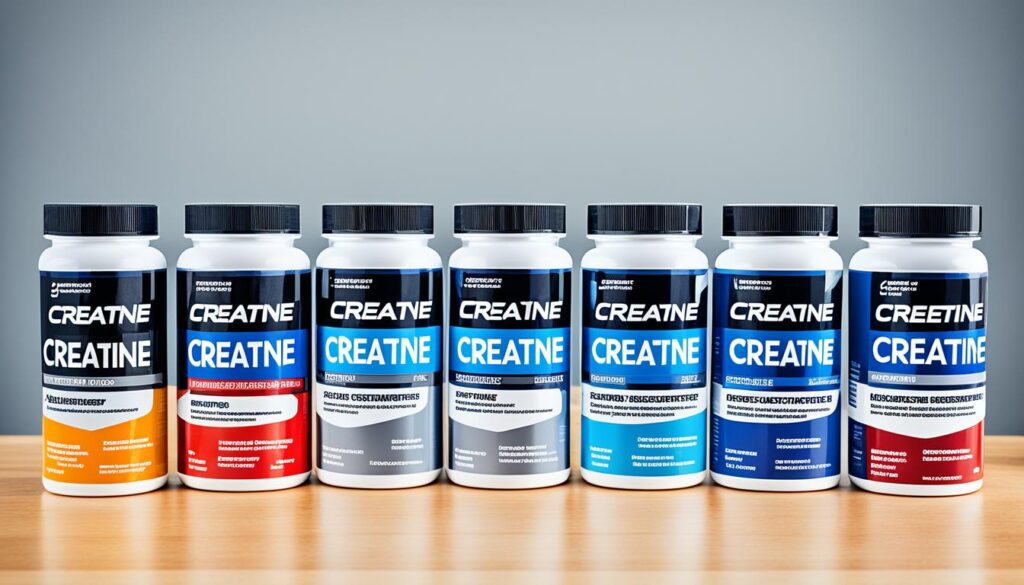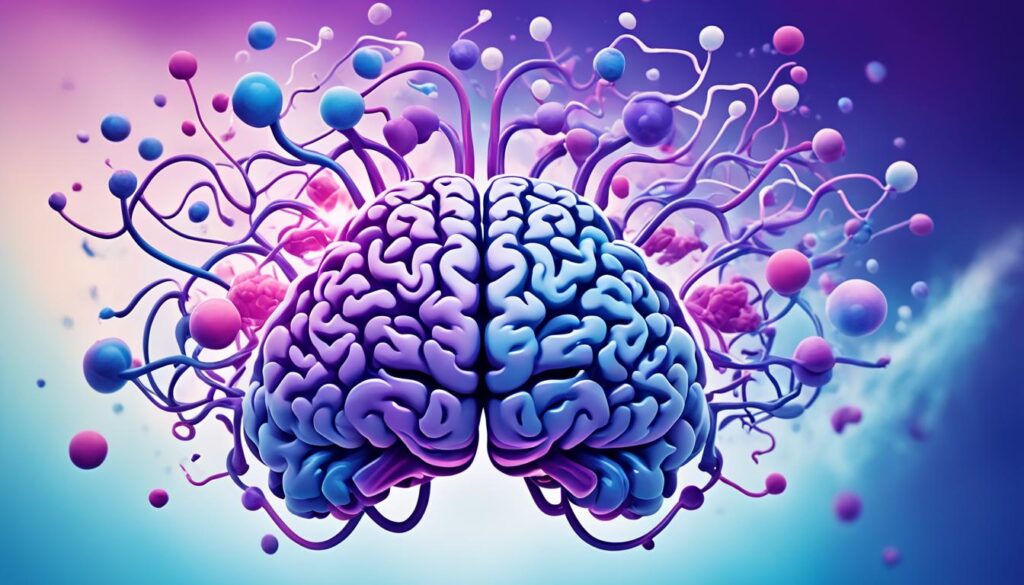Did you know that over 8 million pounds of creatine supplements are sold yearly in the United States alone? These towering sales numbers aren’t just a testament to creatine’s popularity in sports nutrition; they reflect an overwhelming consensus among athletes and fitness enthusiasts: creatine is a game changer for exercise performance, post-workout recovery, and muscle growth. As a devoted researcher and fitness enthusiast, I’ve delved deeply into the science behind creatine and experienced its profound impact on my training outcomes.
Creatine’s rise to stardom in the world of sports nutrition can be credited to its capacity to boost the body’s ATP production, thus providing muscles with the much-needed energy during strenuous exercise. This biochemical advantage plays a crucial role in speeding up the post-workout recovery process and mitigating the fatiguing effects of a grueling workout. Whether you’re aiming for that extra rep or shaving seconds off your sprint, incorporating creatine into your dietary arsenal can be transformative. Join me as we explore the multifaceted ways in which creatine catalyzes muscle recovery and amplifies exercise performance.
Key Takeaways:
- Creatine is a powerhouse in sports nutrition, significantly benefiting post-workout recovery.
- Approximately 8 million pounds of creatine supplements sold annually underline its effectiveness.
- ATP production facilitated by creatine supplements is key to improved exercise performance.
- Including creatine in your diet can accelerate muscle recovery and foster muscle growth.
- The energy supply may impact the body’s capability to undergo more intensive and prolonged workouts.
- Understanding how creatine works can help fitness enthusiasts maximize their training gains.
Understanding Creatine and Its Role in Muscle Recovery
As someone deeply interested in the intricacies of sports nutrition and muscle physiology, I have always been fascinated by the role of certain supplements in enhancing athletic performance and recovery. Creatine, in particular, stands out for its profound influence on muscle repair and regeneration. This naturally occurring substance is not just another add-on in a fitness regimen; it’s a pivotal component for anyone looking to optimize their energy supply and muscle recovery post-exercise.
What is Creatine?
Found within the human body, primarily in muscle cells, creatine is a compound vital for the production of adenosine triphosphate (ATP), the energy currency of the cell. While consuming protein-rich foods such as red meat and fish provides roughly half of our creatine stores, our bodies also endogenously synthesize it in organs like the liver, kidneys, and pancreas. However, the creatine obtained from dietary sources and produced internally may not suffice for those engaging in high-intensity workouts, hence the growing popularity of creatine supplementation for boosting muscular energy reserves.
How Creatine Facilitates Muscle Regeneration and Repair
In the realm of muscle regeneration and repair, creatine is a game-changer. Upon supplementing with creatine, its storage in muscle tissues increases, which is crucial for the repair process post-strenuous workouts. It enables a more rapid resynthesis of ATP during and after exercise, thereby enhancing the body’s ability to sustain high-intensity muscular efforts. This, in turn, minimizes the downtime needed for muscle repair, setting the stage for enhanced muscle recovery and growth over time. The direct impact of creatine on muscle regeneration is underscored by its ability to support cellular hydration and boost protein synthesis—both essential components in the muscle repair process.
The Link Between Creatine and ATP Production
ATP production is at the heart of the metabolic processes enabling muscular contraction. During exercise, ATP is rapidly depleted, and without a sufficient reservoir to draw from, muscle performance and endurance plummet. This is where creatine supplementation steps in; by augmenting the body’s ATP pool, creatine serves as an immediate precursor for ATP regeneration. This boost in energy supply ensures that even during the most demanding workouts, muscle cells have the requisite fuel to perform optimally and recover swiftly thereafter—making creatine an indispensable ally in the quest for peak athletic performance.
By delving into the science of creatine and its pivotal contributions to ATP production and muscle recovery, it becomes abundantly clear that its roles in energy supply, muscle repair, and regeneration are irrefutable. This deep understanding not only validates my utilization of creatine as a core supplement in my fitness endeavors but also reinforces its standing as a cornerstone in the landscape of sports nutrition and muscle health.
The Efficacy of Creatine Supplements in Post-Workout Recovery

As a fitness enthusiast, I’ve observed firsthand the compelling impact of creatine supplements on post-workout recovery. Their role in promoting muscle growth and minimizing recovery time is backed by both science and personal experience. Creatine is particularly effective following strenuous exercise sessions where the body’s demand for a quick energy replenishment is at its peak.
It’s no secret that after intense workouts, our muscles are taxed and in need of nutrients for repair and growth. By augmenting the body’s natural creatine stores, these supplements provide a vital energy source that can help achieve improved performance during future training sessions. The benefit of creatine lies not only in its capacity to accelerate muscle repair but also in its ability to increase the intensity and duration of training, which is essential for muscle development.
Integrating creatine into my post-workout regimen has yielded noticeable improvements in how quickly I bounce back after a demanding workout. It’s a key element in my tool kit for fostering enhanced recovery, allowing me to train more effectively, build muscle, and reduce downtime. Here’s a snapshot of the benefits I’ve reaped from regular creatine supplementation:
- Improved energy levels during and after workouts
- Accelerated muscle repair post-exercise
- Increased muscle mass and strength over time
- Shortened recovery periods between training sessions
Regular creatine supplementation, when combined with resistance training, creates a synergistic effect that catalyzes muscle hypertrophy and strength. This, in turn, enhances overall fitness and body composition, key goals for any dedicated athlete or gym-goer.
| Aspect of Recovery | Before Creatine Supplementation | After Creatine Supplementation |
|---|---|---|
| Energy Supply | Depleted quickly | Replenished rapidly |
| Muscle Repair | Slower, felt soreness | Accelerated, reduced soreness |
| Muscle Growth | Gradual over time | Enhanced growth rate |
| Recovery Time | Longer, more fatigue | Reduced, less fatigue |
Anecdotal and scientific evidence elevate creatine as a powerhouse for anyone looking to level up their post-workout recovery. It’s a testament to the potency of creatine supplements as a means to optimize muscle recovery and enhance overall physical performance, turning post-workout woes into triumphs of fitness resilience.
Clinical Evidence: Reviewing the Research on Creatine and Recovery
Delving into the realm of creatine research, a plethora of studies presents a spectrum of findings on its role in muscle recovery. I have scrutinized the latest publications and clinical trials that evaluate both the immediate impact on recovery time and the sustained effects on muscle regeneration. In this article, I will share the insights gained from these scientific inquiries, tracing the line from empirical data to practical applications.
Study Findings on Creatine’s Impact on Recovery Time
Recent research underscores the potential of creatine to assist in diminishing the degree of muscle damage encountered post-exercise. A closer look at the clinical evidence reveals that creatine supplementation may significantly expedite the recuperation of muscle strength. This is paramount for athletes and fitness enthusiasts who aim to shorten their recovery time and get back to training sooner.
Long-term Benefits of Creatine for Muscle Regeneration
Continued investigation into the long-term impact of creatine has hinted at its role in supporting muscle tissue during the regeneration process. Experts suggest that its consumption is instrumental in aiding satellite cell proliferation – a key player in the repair and building of muscle fibers, therefore bolstering muscle regeneration.
Contrasting Studies and Differing Outcomes
Not all studies sing the same tune when it comes to creatine’s benefits. There have been reports exhibiting a negligible differential in muscle recovery between subjects who use creatine and those who do not. However, the variability could be attributed to differences in muscle groups examined, exercise intensity, and dosages of creatine used across studies. I find it imperative to view this kaleidoscope of research with a nuanced perspective, recognizing the diverse outcomes presented.
Below, a comparative table highlights a selection of key studies that have explored the relationship between creatine supplementation and muscle recovery:
| Study | Participants | Dosage | Findings |
|---|---|---|---|
| Creatine’s Influence on Post-Exercise Muscle Damage | 18 Male Athletes | 5g/day | Reduced muscle damage markers post-exercise |
| Long-term Creatine Supplementation and Recovery | 22 Female Athletes | 3g/day for 8 weeks | Enhanced force recovery post-exercise-induced muscle damage |
| Variability in Creatine’s Recovery Efficacy | 40 Recreational Exercisers | 20g/day loading phase, then 5g/day | Mixed results based on individual physiology and workout intensity |
In the synthesis of clinical evidence, I recognize that creatine stands out as a significant supplement in the domain of sports nutrition, impacting not just the immediate aftermath of physical exertion but also the overall condition of muscle health over extended periods. The key takeaway from this exploration is that while individual responses to creatine vary, it certainly holds a place of prominence for its ability to potentially enhance muscle recovery and support muscle regeneration.
Finding the Right Creatine Dosage for Optimal Muscle Recovery

As someone deeply invested in muscle health and performance, I understand the importance of tailoring my creatine intake for optimal muscle recovery. With sports nutrition recommendations in mind, the starting point often involves a loading phase to boost creatine levels within the muscles, followed by a sustained maintenance dosage. It’s essential to note that individual responses to creatine dosage can vary considerably depending on a host of factors.
I have noticed that during the initial phase of creatine supplementation, engaging in a loading period where I consume between 20 to 25 grams of creatine per day, split into multiple servings, has helped significantly in saturating my muscles with creatine for immediate and enhanced recovery. This is followed by a maintenance dose, which typically ranges between 2 to 10 grams daily, keeping my muscles primed and my recovery on track.
Each individual’s creatine needs are unique, and it’s paramount to adjust your dosage based on personal response, exercise regimen intensity, and body composition for the greatest benefits to your muscle health.
- Assess body weight and exercise intensity
- Begin with a loading phase
- Transition into a maintenance phase
- Monitor muscle recovery and adjust as necessary
| Phase | Loading Dosage (per day) | Maintenance Dosage (per day) |
|---|---|---|
| Loading Phase (5-7 days) | 20-25 grams | N/A |
| Maintenance Phase | N/A | 2-10 grams |
It’s not merely about consuming creatine; I must ensure it aligns with my optimal muscle recovery goals. Therefore, continuous monitoring and potential adjustments to my creatine dosage become part of my routine. If I’m preparing for a competition or ramping up my training intensity, fine-tuning my creatine consumption is an important step in supporting muscle health and recovery.
In conclusion, while the general guidelines for creatine dosage are widely endorsed, the key to maximizing its efficacy lies in individualizing the approach based on my personal muscle recovery needs and responses. Thus, I embark on a journey of careful experimentation, backed by sports nutrition wisdom, to unveil the perfect creatine regimen that aligns with my body’s unique blueprint for success.
Boosting Exercise Performance with Creatine Supplementation
The dynamic interface between creatine supplementation and athletic performance continues to draw the interest of athletes and fitness aficionados worldwide. Known for its remarkable impact on energy metabolism within muscles, creatine serves as an essential adjunct for those striving to achieve peak physical performance. Let’s delve into the specifics of how creatine aids athletes in both the short and long term.
Short-term Versus Long-term Effects on Athletic Performance
Renowned for its short-term effects, creatine supplementation is particularly beneficial for activities that demand rapid, explosive bursts of power. The robust effect of creatine’s energy-boosting properties can be seen in sports that require swift movements, such as sprinting, football, or heavy lifting. Acute creatine usage can markedly increase one’s performance in these high-intensity endeavors by resaturating the phosphocreatine stores, thereby rapidly replenishing ATP, the energy currency of the cell.
Transitioning to the long-term benefits of creatine, consistent use is associated with substantial increases in muscle mass and strength, courtesy of improved workout capacity and subsequent muscle hypertrophy. Across various sports disciplines, the enduring effects of creatine can lead to enhanced endurance, speed, and cognitive function, broadening its appeal beyond the immediate surge of strength.
How Creatine Supplementation Benefits Different Types of Athletes
Regardless of one’s sport, the allure of creatine supplementation extends through varied fields of athletic endeavor. Powerlifters may glorify creatine for its impact on maximal strength achievements. Meanwhile, track athletes can appreciate the enhanced anaerobic capacity that allows them to shine in short-distance events. On the other hand, team sport athletes might leverage creatine’s neuroprotective and cognitive benefits, which contribute to rapid decision-making and improved gameplay under pressure.
| Athlete Type | Short-term Benefit | Long-term Benefit |
|---|---|---|
| Weightlifters | Increased max lift capacity | Greater muscle hypertrophy |
| Sprinters | Enhanced sprint performance | Improved speed and recovery |
| Team Sports Athletes | Faster cognitive processing | Sustained skill execution |
As we continue to explore and understand the wide-ranging advantages of this versatile supplement, it becomes increasingly clear why creatine supplementation is a staple in the sports nutrition regimen of so many dedicated athletes.
Dissecting the Mechanisms: How Creatine Aids Muscle Recovery

As a dedicated proponent of optimal fitness and muscle health, I’ve come to understand that the muscle recovery mechanisms employed by creatine play an indispensable role in athletic performance. Creatine’s ability to mitigate muscle damage and catalyze recovery is unrivaled, making it a cornerstone supplement for athletes. The multifaceted nature of creatine’s intervention in muscle recovery starts at the cellular level. By stabilizing cell membranes, it ensures that the integrity of muscle fibers is maintained during the most grueling workouts. Below is an exploration of how the role of creatine intersects with physiological processes to support exercise performance and muscle health.
One of the key features in creatine’s arsenal is its ability to rapidly replenish ATP stores, which are crucial for sustained high-energy output. It is this capacity that enables athletes to push past their usual limits and achieve higher work outputs. Moreover, creatine’s influence on satellite cell proliferation is a game-changer when it comes to the repair of damaged myocytes, making it an essential tool for muscle recovery and health.
| Recovery Mechanism | Role of Creatine | Impact on Exercise Performance |
|---|---|---|
| Cell Membrane Stability | Minimizes cellular component loss | Preserves muscle integrity during intense exercise |
| ATP Replenishment | Enhances energy availability | Enables longer, high-intensity workout capacity |
| Satellite Cell Proliferation | Supports muscle fiber repair | Improves recovery rates post-exercise |
Through my research and firsthand experience, it’s evident that creatine is more than just a common supplement—it’s a pivotal ally in the quest for peak muscle performance and swift recovery. With its well-documented role in muscle health, creatine continues to be a staple in the regimen of athletes who prioritize rapid recovery and exceptional performance.

My exploration into the realm of creatine safety has introduced me to a myriad of insights, from the groundbreaking studies to real user testimonials, all painting a comprehensive picture of creatine’s influence on muscle health. As we delve into the side effects and safety data, and discuss guidelines for safe consumption, I’ll unravel the reality beneath common misconceptions.
Exploring Common Misconceptions and Safety Data on Creatine Use
Throughout my research, it’s become clear that creatine misconceptions are often unfounded. Clinical data reveals a reassuring snapshot: most individuals can enjoy the muscle health benefits of creatine without adverse side effects when adhering to recommended guidelines. Indeed, the fears around renal distress and cramping have generally been debunked by scientific scrutiny, proving creatine to be a stalwart ally in the pursuit of peak physical performance.
While considering creatine safety, one must look beyond anecdotes and seek the empirical evidence that predominantly reinforces the supplement’s benign nature when used judiciously.
Guidelines for Safe Creatine Consumption
I adhere strictly to the established guidelines for creatine intake, which stress the importance of consulting healthcare professionals, especially for individuals with pre-existing conditions. Pregnant and nursing individuals are advised to abstain, highlighting a gap in safety data for these populations. I am constantly reviewing the latest research to ensure my recommendations for safe consumption stay current.
| Condition | Recommended Action | Reasons |
|---|---|---|
| Pre-existing kidney conditions | Consult healthcare provider | Risk of exacerbated renal stress |
| Diabetes | Consult healthcare provider | Interactions with insulin sensitivity and glucose metabolism |
| Pregnancy | Avoid use | Insufficient safety data available |
| Breastfeeding | Avoid use | Insufficient safety data available |
In conclusion, my journey demystifying creatine safety confirms it as a boon for muscle health when embraced with safe consumption practices. Side effects are relatively rare when guidelines are followed, empowering individuals to enhance their muscular fortitude responsibly.
Comparative Analysis of Different Forms of Creatine Supplements

As a committed advocate for optimizing muscle recovery and understanding supplement efficacy, I find the varied creatine forms available on the market to be of considerable interest. Creatine monohydrate, often hailed as the benchmark for sport supplement evaluation, has stood the test of rigorous research. However, in the pursuit of continuous improvement and innovation, various alternative creatine compounds have been developed. These alternatives promise enhanced absorption rates or a reduction in potential side effects, thereby appealing to athletes and fitness enthusiasts who continuously strive to make informed choices for their supplementation needs.
Assessing the Impact of Various Creatine Forms on Muscle Recovery
My inquiry into these creatine forms critically examines whether these newer formulations offer tangible benefits in muscle recovery after intense physical exertion. As someone who prioritizes evidence-based outcomes, I believe it’s crucial to scrutinize whether these claims hold up under scientific scrutiny or whether they primarily serve as marketing ploys. Therefore, a comparative table is essential to visually convey the differences between these forms, taking into account their absorption, efficacy in muscle recovery, and overall research support.
Evaluating the Efficacy of Creatine Monohydrate Versus Alternatives
The contrast between creatine monohydrate and its alternatives emerges from an analysis rooted in scientific data, where creatine monohydrate continues to solidify its position as the leading choice. My examination is not simply a repetition of common consensus but is an informed dissection of current research that illuminates the nuances of supplement efficacy. In my role, I provide clarity on these alternatives and offer insights into their comparative performance, guiding my readers toward making well-informed decisions regarding their supplementation strategies.
| Creatine Form | Benefits | Research Support | Suitability for Muscle Recovery |
|---|---|---|---|
| Creatine Monohydrate | High bioavailability, well-researched | Extensive | Proven for high-intensity and resistance exercises |
| Creatine Ethyl Ester | Claimed to have better absorption | Moderate | Less evidence of efficacy in muscle recovery |
| Buffered Creatine | Claimed to reduce side effects | Limited | Comparable to monohydrate, further research needed |
| Liquid Creatine | Convenience of use | Minimal | Concerns over stability and efficacy |
| Creatine Hydrochloride (HCl) | High solubility, lower doses required | Emerging | Shows promise but requires more research against monohydrate |
Delving into the intricacies of each creatine form allows me to assess their purported advantages with a critical eye. It is through this meticulous evaluation that I aim to disseminate accurate and up-to-date information, underpinned by my resolve to offer advice that will ultimately serve the best interests of my readers’ fitness and recovery goals.
Beyond The Muscles: Exploring Creatine’s Broader Impacts

While widely recognized for its role in muscle development, creatine’s influence extends to critical areas of wellness that may surprise you. Beyond enhancing physical performance, creatine impacts have sparked interest for their possible benefits on brain health and heart health. Let’s delve into how this powerful compound could play a role in neuroprotection and cognitive enhancement.
The Influence of Creatine on Brain and Heart Health
Often overlooked, the presence of creatine in the brain and heart suggests it’s more than just muscle fuel. In these organs, creatine’s energy-buffering capacity is just as vital, as it assists in maintaining cellular energy homeostasis. This support is crucial for the high energy demands of both heart and brain functions, with evidence stating that creatine supplementation may bolster brain health, contributing to enhanced cognitive function, especially in aging populations.
When it comes to heart health, studies are exploring how creatine supplementation may affect myocardial metabolism, potentially offering a supportive treatment for cardiovascular diseases by improving the heart’s energy efficiency and reducing oxidative damage.
Applications of Creatine in Neuroprotection and Cognitive Enhancement
In the realm of cognitive enhancement, the potential neuroprotective effects of creatine are being closely examined. With its ability to increase phosphocreatine levels in the brain, creatine supplementation may protect neurons, support overall brain health, and even play a preventive role against neurological diseases.
Recent research highlights creatine’s promising role in mitigating factors associated with cognitive disorders such as dementia. By sustaining cellular energetics, this compound may slow the progression of neuronal damage, offering a new avenue for neuroprotection strategies. Furthermore, creatine’s positive effects on short-term memory and reasoning are shedding light on its capacity for cognitive enhancement, especially pertinent for the aging brain that may naturally diminish in energy metabolism over time.
Personalizing Creatine Intake: Tailoring Supplements to Individual Needs

As we delve deeper into the nuances of supplement customization, it becomes increasingly evident that a proactive approach, which incorporates both genetics and lifestyle factors, is imperative for optimizing the effectiveness of creatine. Personalizing your creatine regimen isn’t merely a suggestion; it’s a substantial step towards aligning your supplement intake with your body’s unique needs and fitness goals. Let’s explore how you can tailor your creatine consumption to reflect these personal variables.
Factors to Consider When Customizing Your Creatine Regimen
When I contemplate personalizing my creatine intake, my focus shifts towards a set of pivotal factors that influence its impact. The journey towards supplement customization begins with an assessment of daily nutritional intake, habitual exercise routines, and even the type of sports I engage in regularly. As fitness enthusiasts, we must consider:
- Dietary preferences and existing nutritional profile
- Frequency, intensity, and type of workout regimens
- Specific fitness objectives, such as increased strength, endurance, or muscle mass
Each of these elements contributes to determining the most suitable creatine dosage and form, paving the way for a tailored supplementation strategy.
The Role of Genetics and Lifestyle in Creatine Efficacy
My exploration into personalizing creatine intake extends beyond the visible aspects of diet and exercise; it delves into the genetic blueprint that plays an understated yet decisive role. Genetic variation can influence how effectively my muscles uptake and utilize creatine, necessitating adjustments to my supplementation plan. Additionally, my lifestyle factors—including sleep patterns, stress levels, and occupational demands—warrant scrutiny as these can impact my body’s responsiveness to creatine.
Customizing creatine intake is not merely about achieving optimal physical performance; it’s about aligning supplementation with your entire biological ecosystem.
While we each embark on a journey toward enhanced muscle recovery and performance, acknowledging and embracing our individual differences is crucial. Through attentive modification of our creatine regimes—guided by an understanding of genetics, diet, and lifestyle—we can cultivate a truly personalized approach to our supplementation, one which has the potential to elevate my athletic pursuits to new heights.
Conclusion
Throughout my exploration into the world of sports nutrition, I have come to recognize the substantial impact of Creatine on Muscle Recovery. My deep dive into current research and expert analysis has solidified my understanding of the pivotal role played by creatine supplements in promoting muscle health and enhancing exercise performance. Evidently, creatine’s rich contribution to ATP production is a cornerstone of improved post-exercise recovery, fueling muscle cells for strength gains and expedited healing.
That said, I appreciate that creatine’s benefits aren’t limited to muscle fibers alone. The compound’s influence reaches into the realms of cognitive function and cardiovascular wellness, truly positioning creatine as a versatile ally against a spectrum of physiological challenges. Still, even with its broad applications, personalizing the intake of creatine remains essential to harness its full potential. Tailoring the dosage and form of creatine intake to fit individual training demands and genetic predispositions can maximize outcomes and support dedicated athletes in their quest for peak performance.
As someone committed to maintaining an optimal fitness regimen, I find the confluence of evidence supporting creatine’s efficacy quite compelling. Whether my aim is to boost recovery, enhance strength, or support overall health, relying on a well-researched ally like creatine monohydrate fits seamlessly into my performance-enhancing toolkit. It stands clear: For individuals like myself who take an evidence-based approach to nutrition and training, creatine is more than a supplement; it’s a fundamental component of a robust athletic lifestyle.
FAQ
What is Creatine?
Creatine is a naturally occurring compound found in the human body and in dietary sources like red meat and seafood. It’s essential for energy production, particularly during high-intensity, short-duration exercises. Creatine supplements are often used to increase muscle creatine stores, muscle mass, strength, and exercise performance. The most common form is creatine monohydrate.
How does Creatine facilitate muscle regeneration and repair?
Creatine supplements help regenerate ATP, the primary energy carrier in our bodies, which is crucial during and after intense physical activity. This rapid replenishment of ATP allows muscles to recover more quickly, reduces muscle damage, and facilitates muscle repair and growth by supporting cellular energy demands.
What is the link between Creatine and ATP production?
Creatine plays a pivotal role in the rapid production of ATP (adenosine triphosphate), which muscles use for energy. During exercise, ATP is broken down to produce energy, and the resynthesis of ATP from creatine phosphate aids in the continuation of exercise and delays muscle fatigue. This process is especially critical during high-intensity, explosive movements such as sprinting or lifting weights.
How effective are Creatine supplements in post-workout recovery?
Creatine supplements have been shown to enhance post-workout recovery by replenishing energy stores more rapidly, reducing muscle soreness and inflammation, and increasing the muscle’s potential to build new proteins for repair. This can lead to reduced recovery time and better overall muscle growth from training.
What does the clinical evidence say about Creatine’s impact on recovery time?
Clinical studies suggest that creatine supplementation can reduce the recovery time needed between bouts of high-intensity exercise by enhancing energy replenishment and muscle repair processes. However, some studies show variable results depending on the type of exercise and the individual, indicating that the benefits of creatine can be influenced by several factors.
What are the long-term benefits of Creatine for muscle regeneration?
Over the long term, consistent use of creatine supplements can contribute to increased muscle mass, improved strength, and better muscle cell repair and regeneration. This is partly due to creatine’s role in promoting satellite cell proliferation, which is essential for muscle growth and repair.
Are there contrasting studies and differing outcomes on Creatine’s efficacy?
Yes, while many studies support creatine’s effectiveness for improving muscle recovery and exercise performance, there are also studies with varied outcomes. Differences in study design, subject populations, exercise protocols, and dosing regimens may contribute to these contrasting results, and not everyone may respond to creatine supplementation in the same way.
How do I find the right Creatine dosage for optimal muscle recovery?
The optimal dosage of creatine can vary depending on individual factors like body weight, diet, and exercise intensity. A typical regimen begins with a loading phase of 20 to 25 grams per day for about 5-7 days, followed by a maintenance phase of 2 to 10 grams daily. It’s advised to tailor your intake to your specific needs and possibly seek guidance from a healthcare professional or a sports nutritionist.
What are the short-term versus long-term effects of Creatine on athletic performance?
In the short term, creatine supplementation can improve immediate exercise performance, particularly in high-intensity, explosive activities like sprinting or heavy lifting. Long-term effects include sustained improvements in exercise capacity, overall strength, and muscle size, as well as potential cognitive and health benefits.
How does Creatine supplementation benefit different types of athletes?
Creatine benefits athletes who engage in sports requiring quick bursts of energy, such as sprinters, football players, and weightlifters. For endurance athletes, the benefits might be less pronounced but still significant in terms of improved training quality and muscle recovery. Additionally, recreational exercisers and bodybuilders may experience enhanced muscle growth and recovery from creatine supplementation.
What mechanisms aid Creatine in muscle recovery?
Creatine contributes to muscle recovery through multiple mechanisms. It stabilizes cell membranes, reducing muscle cell damage; increases satellite cell proliferation, aiding muscle repair; replenishes ATP stores quickly, improving energy availability; and may reduce oxidative stress, contributing to a faster recovery process.
What are common misconceptions and safety data on Creatine use?
Common misconceptions include the belief that creatine causes dehydration, cramping, and damages the kidneys. Extensive research has shown that creatine, when used at recommended doses, is safe and does not cause significant adverse effects in healthy individuals. However, as with any supplement, it’s important to consider individual health conditions and consult with a healthcare professional before starting supplementation.
What guidelines exist for safe Creatine consumption?
Safe consumption guidelines recommend staying within the advised dosing schedule, starting with a loading phase followed by a maintenance phase. Individuals with pre-existing kidney or liver conditions, pregnant or breastfeeding women, and children should avoid creatine supplementation or seek medical advice before use. Staying hydrated and combining creatine with a balanced diet and exercise program is also recommended.
How do various forms of Creatine impact muscle recovery?
While there are multiple forms of creatine available, creatine monohydrate has been the most extensively studied and is proven to be effective for muscle recovery. Other forms like creatine ethyl ester or buffered creatine claim enhanced benefits but often lack robust scientific backing to surpass the efficacy of monohydrate in muscle recovery.
What is the efficacy of Creatine Monohydrate versus alternatives?
Creatine monohydrate remains the gold standard among creatine forms for its efficacy in improving muscle recovery, strength, and mass. It is well-researched, cost-effective, and has a strong safety profile. Alternative forms have arisen, but none have consistently shown superior results when compared with creatine monohydrate.
How does Creatine influence brain and heart health?
Beyond muscle recovery, creatine has been linked to enhanced brain function, particularly in tasks involving memory and intelligence. It is also associated with potential heart health benefits, but research in these areas is ongoing. Creatine’s role in cellular energy production suggests it can support the respective energy demands of the brain and heart.
What applications exist for Creatine in neuroprotection and cognitive enhancement?
Creatine has been explored for its neuroprotective effects, possibly contributing to the maintenance of cognitive function and the prevention of neurological diseases. Some studies suggest creatine may benefit cognitive enhancement, particularly in aging populations, but further research is warranted to fully understand these applications.
What factors should I consider when customizing my Creatine regimen?
When customizing creatine intake, consider factors like your body weight, current diet, exercise intensity, and goals. Genetic factors may also play a role in your body’s ability to take up and utilize creatine, and lifestyle factors like sleep and stress levels can impact your regimen’s effectiveness.
How do genetics and lifestyle affect Creatine efficacy?
Genetic variations can influence how effectively someone responds to creatine, affecting the uptake into muscle cells. Additionally, lifestyle factors such as overall diet quality, meat consumption, and activity levels can impact the natural creatine stores in the body and, consequently, the amount that needs supplementing to see benefits.




